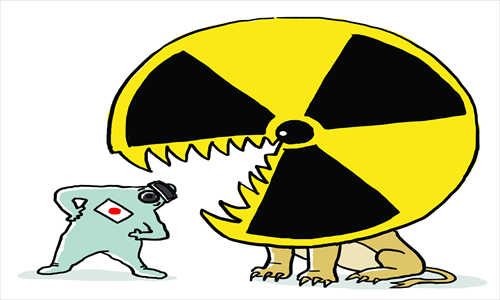Japan politicians’ call for doomsday devices will prove utterly futile

Ishihara Shintaro gave a speech on November 20 in which he stated that Japan should have its own nuclear arsenal, saying that this will increase the power of Japan's deterrence.
But has there ever been any deadly weapon that really acted as a deterrent? And would a nuclear arsenal really benefit Japan?
Japan's door was forced open by Western powers in the mid-19th century but it soon embarked on a road of military expansion. Its growth in military power may have put off the countries that first invaded it, but this soon changed from deterrence to active invasion of its neighbors. From then on, there was no more question of deterrence.
Japan's national pride was initially reaped not from a peaceful rise but by force and war, with numerous atrocities committed along the way.
This pride was also long built on the ideology of domination over other nations and peoples.
While it is perfectly good for Japan to have a sense of national pride, it is unconscionably for it to retain any vestiges of its old mentality.
The theory of deterrence is invalid for Japan as no other country has invaded Japan since the end of World War II. Although the US still maintains armed forces in the country, this stems from Japan's own choices. If the deterrence is aimed at China, Japan should remember China has never invaded Japan and will not do so in any foreseeable future. After all, the will of China to safeguard its sovereignty and territorial integrity will never be deterred.
Although the deterrence theory is not justified for others, it can well be accounted for when directed at Japan itself. In the face of numerous problems, Japanese politicians have come up short of finding the right solutions. With domestic and external troubles, natural and man-made disasters, the nationalist ruling class just cannot provide a satisfactory solution to the Japanese people. They are too impatient to find good solutions and too rash when making decisions.
Meanwhile, the rise of China has made them more agitated and worried. A scheme to divert the nation's attention from domestic issues to fabricated international troubles does not save the fate of their leaders, but only worsens the situation and makes their lack of ability startlingly clear.
Against such a background, the call for Japan's own nuclear deterrent has now reared its ugly head. But this claimed deterrence of others has been born from a lack of confidence when facing problems at home.
Nuclear weapons are deadly, so how could Japan possibly see them in a positive light? Historically, the only country and people that have suffered from nuclear attack is Japan, a tragedy not forgotten today. Given such misfortune, there is no reason for the Japanese people to want nuclear weapons. The people surely do not want such weapons for themselves, and they do not wish others to repeat their suffering. So the calls for a nuclear arsenal by some Japanese politicians are hollow and misleading.
Given its expertise in advanced science and high technology, no one can doubt Japan's capability to produce nuclear weapons in a short period of time. But questions remain: Will Japan have the moral fortitude to use them only for self-defense, especially considering the revival of its militarist tendency and the new generation of populist politicians? Does Japan really have the capability to keep such technology safe?
As the nightmare of the Fukushima nuclear power plant accident still haunts Japan, people may have more reasons to doubt this claim.
If nuclear powers used for peace and developments cannot benefit Japanese society, how can nuclear power bent for war and destruction increase national wellbeing?
Therefore, whatever the nationalist politicians may preach, it would stand the Japanese people in good stead to think again before choosing to possess a nuclear arsenal, even if they get the go-ahead to do so. Peaceful co-existence and common development is the only solution for Japan's problems.
The author is administrator of the Office of International Cooperation and Exchange, Tsinghua University. qlliu@tsinghua.edu.cn